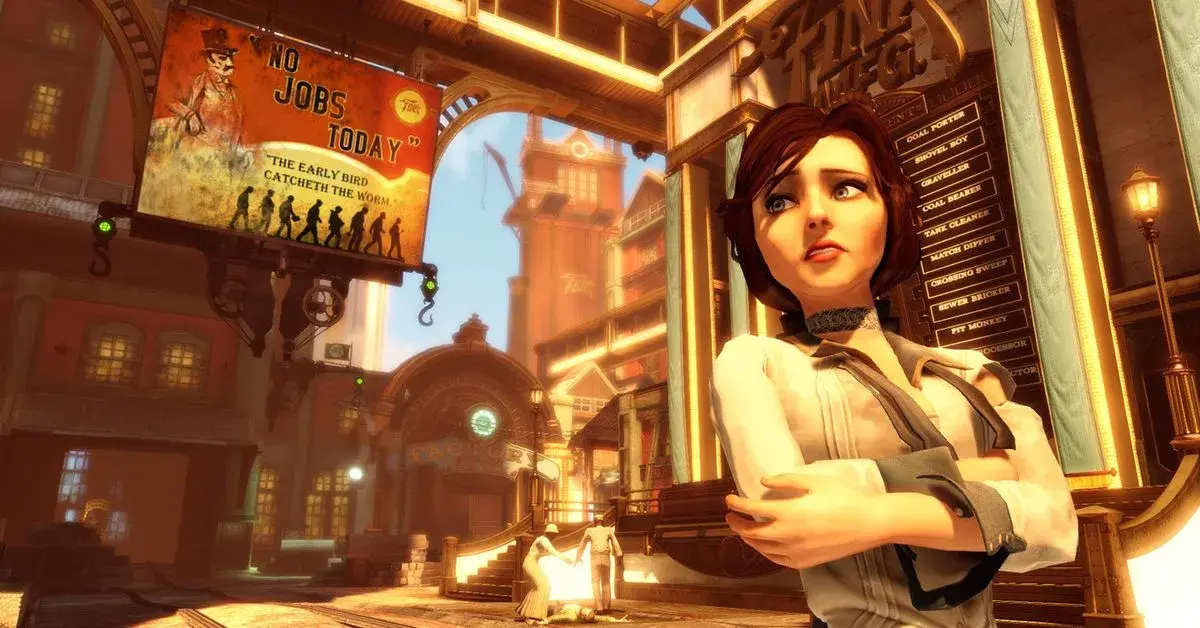Thought this was a fun article to read, wanted to share. I think it’s interesting that as societal and political views at large shift in the 2020s, it’s good to go back and reevaluate how narratives are portrayed even as recently as 2015.
FTA:
The crucible of how the game treats its profundity is in the relation between its white Founders faction, which is in power, and its rebellious Vox Populi, who are attempting to liberate the oppressed racial and political classes of Columbia. The player stands between these two forces, doing tasks for each in turn, eventually learning that both are insufficient in creating a good reality. As Chris Franklin highlighted in a recent video, this is a common refrain in projects that Levine has worked on: putting the player in the position of a mediating force between two extremes. The player can feel pulled, and compelled, toward different directions while ultimately being forced down a particular path. Playing as a character who is terminally in the middle of the road allows us to point fingers at any insufficiencies we see in the world around us — as King put it, “gamers like to feel smart,” and seeing the gaps of logic in the various worldviews on display can make us feel like clever social analysts. A player uses magic in their left hand while holding a gun in their right hand in a screenshot from BioShock Infinite.
From the vantage of 2024, it seems that one of the key problems of Infinite’s view from nowhere is infinity itself. No matter your viewpoint, Infinite seems to present you with some ideas that might align with your vision of the world and others that might challenge you. This is probably an admirable goal — art can give us perspectives on the world that we don’t yet understand, and that’s one of the many ways that creative expression can change us.
If there’s an issue here that generates the endless debates about whether Infinite is good, it’s that the game does not provoke us with a particular person’s, group’s, or ideology’s perspective. Instead, it just confronts us with the idea that many different ways of existing in the world are real, and any of them taken to their logical extreme will exclude all others. What produces the “both sides” problems of Infinite is a problem of imagination. Infinite is a universe of plural worlds, and if any of them takes over fully, everything goes bad.
Full disclosure, I was disappointed in the majority of the replies this got when I first posted it, and as a knee-jerk reaction I took it down. But I encourage you to at least read the quotes.



I enjoyed Bioshock Infinite a lot back on the Xbox 360. The whole city in the clouds but also it’s the early 20th century setting was really attractive to me, and I enjoyed it pretty much throughout. Elizabeth being an actually useful NPC sidekick that you don’t have to do endless shitty escort missions for was a great move. I don’t understand the hate it gets after a few years have passed.
It was criticized when and after it came out, so it isn’t something that’s come up recently. But as you mentioned, there were some praises as well, as NPC escort missions were a bane in gaming at the time and this game did get praise for Elizabeth for that.
However, much like the comment “the medium is the message”, I think also Bioshock was a series that was very close to people’s hearts and they had a specific idea about what exactly made it feel like that atmosphere. My stance has always been, Bioshock Infinite is a phenomenal game that isn’t quite Bioshock, and there’s nothing wrong with that, but it’s like… It’s like the entirety of the series Metroid, and then Other M. Had Other M been literally any other name and character, it would have been a perfectly fine game.
But since it, and Bioshock Infinite, are tied to their namesakes, staying in line with that atmosphere that they create is imperative for a fanbase. For all of the faults that Bioshock 2 had, they still nailed the thematic portion of the world that appealed to so many people in Bioshock 1. They’re dark, gritty, a musk of musty air fills the entirety of the game and characterization. They’re also quite creepy, with that setting on top of the insanity and tight enclosed spaces under the oppression of the ocean.
Bioshock Infinite seems to abandon that thematic element almost entirely. And mind you, they did the bright and airy world very well, I can only imagine what it would have been like if they had been able to complete the entirety of their vision! I suspect something like Legend of Zelda: Tears of the Kingdom size was always the goal, given all the details shared about what they had to cut out.
That tonal shift I am almost certain is a majority of the cause for the issues with Bioshock Infinite - as this was the sentiment I gathered upon release and the coming years. It was two-fold though too, because by changing the nature of the tonality of the game, the gameplay itself seemed to be “brightened”, maybe in an attempt to make it more accessible, maybe to make it more engaging, but it seems pretty commonly agreed that Bioshock Infinite is just easier. The puzzles seemed toned down (IMO almost more of a point a -> point b puzzle), and while yeah the ending was a very well done version of this, I think many also felt like it somewhat removed the agency the players were struggling with, just to toss in a “you have and always will be” multiversal moment.
Anyway, all this to say, these aren’t explicitly my opinions on Bioshock, I’m just an analyst. I enjoyed most of Bioshock Infinite, but it is clear to see that there is a difference in the show-don’t-tell of Bioshock and the tell-show-tell of Bioshock Infinite. I actually am able to replay Infinite, where I have a hard time replaying 1 and especially 2, just because they’re so goddamn scary for me, lol. Much of the gameplay of Infinite is also just slightly more modern, with 1 and 2 just being slightly slower and clunkier without the movement option of the grappling hook.
I think another way of putting this is to look at an entirely different game, We Happy Few. It seems to me that We Happy Few wanted to make the atmosphere of Bioshock 1 but with the brighter narrative style of Bioshock Infinite, which inevitably resulted in the clashing of those two themes. In the case of Bioshock Infinite, it is that very same clashing of themes which I think heavily affected the players perception of the game. Again, had it been named, like, “Sky Cultist: Enigma” or something like that, it would have been perfectly well received and would have maybe even gone down in gaming history positively. Instead, it was tied to Bioshock and is kinda seen as “it’s good but meh” as a byproduct of such a drastic shift. I also think the desire to go from sea to sky is just a little cheesy, and while it was done well enough I’m also sort of hmmmeehh on that whole side of it. Fun areas to play in, but… not very Bioshocky, even with the steam punk elements.
Which is too bad. It had many technically good qualities about it, from the story arcs, from memory I feel like the pacing was pretty good, I remember the gameplay early and mid-way being fun although I do feel like I remember just a little bit of bullet spongeyness and resource/ammo collection mid-late sections of the game. Obviously the ending was quite good, and I really enjoyed the cult story. However, the bright sky world is very contrasting to the murderdeath cult and gore of it all, and I personally wasn’t as big of a fan of the thematic shift, both in the overworld but also in the march towards the Industrial Revolution. It just felt so out of place to me (specifically the Patriots, or maybe I just hated fighting so many of them) considering we had this entire underwater industrial complex in Rapture. However this is alleviated somewhat by the ending of Infinite, since these are all infinite possibilities oooooohhhh the name makes sense nowwwww!
So yeah, all in all I think it turned a bit underwater espionage revealing the secret project to the world to floating cult investigation revealing the… secret project to the world.